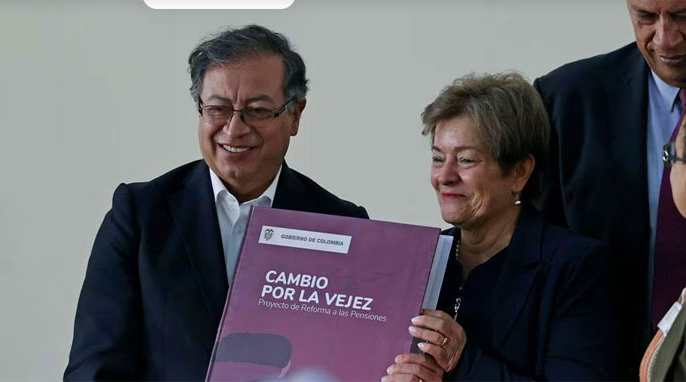
Petro before the pension approval of the Senate. Image: elespectador.com
By María Josefina Arce
The pension system in Colombia is unequal and inequitable, with a high fiscal cost. Currently, some 4 million so-called senior citizens do not have any protection in their old age.
Therefore, one of the commitments of the government chaired by Gustavo Petro is to achieve greater access and coverage, focused on the most vulnerable people, especially women, since they are the ones who have the least access to a pension in the South American country.
A year ago, the authorities submitted a pension system reform project to Congress, described by many as necessary not only for issues of sustainability, but also for justice.
This has been stated by the president, who has emphasized that this proposal seeks to ensure that every older adult, without distinction of sex, can have and enjoy a pension.
However, the maneuvers of the right-wing parties kept its debate blocked, which reduced the possibilities for its approval, since the maximum deadline for it not to be rejected is until June 20.
Last week, its approval was achieved in the Senate for analysis, after successfully overcoming proposals against it, such as that of a senator from the so-called Party of the U, Union for the People, who played an essential role in the collapse of the reform. of health, which sought to bring health care to all citizens.
Finally, the legislators sanctioned the more than 90 articles that make up the project, which will now go to the House of Representatives, where it will be subjected to two debates.
The reform is based on 4 pillars. The solidarity program stands out, which would benefit nearly 2 million Colombians, as it would provide a monetary transfer for women aged 60 or older and men aged 65 and older in conditions of poverty, extreme poverty and vulnerability.
Official data reveal that 28.4% of older adults are in a situation of monetary poverty, a panorama that is more critical in rural areas.
It also contemplates the so-called semi-contributory for women and men in the age ranges already mentioned and who have contributed to the pension system for at least 300 weeks.
And according to the National Administrative Department of Statistics, in Colombia it is common for women to reach 60 years of age and men to 65 without having the number of weeks of contributions required for a pension, given the high rate of informal work. .
The reform proposed by the Petro government seeks to do justice, putting in the center of attention all those Colombians who have been failed by the current pension system.

